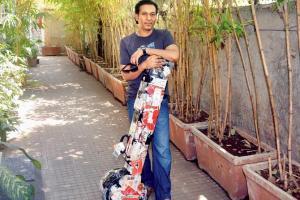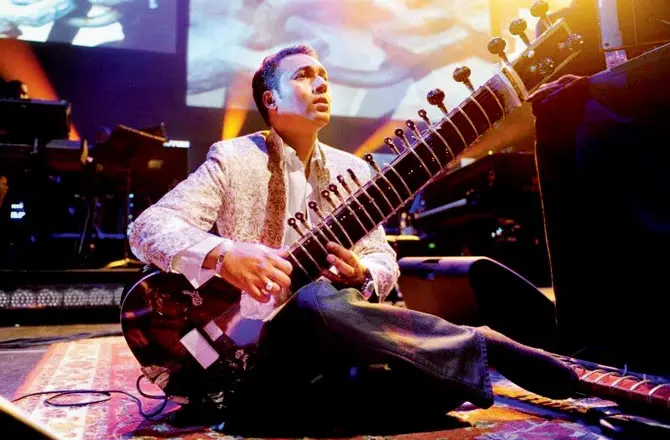A sitar player from a legendary gharana teams up with musicians with illustrious backgrounds to make it a music-in-your-genes evening

Hidayat Husain Khan. Pic/Sayyed Sameer Abedi
There is a sitar case covered with faded stickers resting on a couch when we meet Hidayat Husain Khan, ahead of a concert that he'll play in the city tomorrow. We are at the swish rented apartment in Bandra's Hill Road where the US-based Indian classical maestro has been put up, though looking at him — dressed in jeans and a T-shirt — you'd be hard-pressed to imagine the sort of legendary gharana he was born into, which includes his father, Ustad Vilayat Khan, arguably India's greatest ever sitar player. And as he settles down for a chat, we point out how well travelled his case looks when Khan laughs and says, "It has been through many battles across different borders," referring to how baggage handlers at airports are notorious for treating musical instruments with disregard.
ADVERTISEMENT
His own musical journey, however, began even before he was born. Khan tells us about how, when his mother was pregnant with him, she was taught how to play the sitar so that the child would have music running in his veins from the get go. He adds, "There is actually an instrument in our house that's a toy sitar about this big [indicates a three-foot size with his hands]. It would be passed around among all the children, who'd outgrow it when they were only two or three years old, and you know, this whole small electronic sitar that came about happened because of that very baby sitar. So, that's how early on music starts for people in our family and when you hear khandani musicians saying, 'Oh, I played my first concert when I was eight or nine years old,' it's not some anomaly. It's natural. You were doing it even before you were born."

The sitar, though, wasn't the primary concern of Khan's childhood. Instead, his father pushed him towards vocal training, with him starting to learn the sitar seriously only when he was about 15 years old. But what happened as a result is that the teenager's approach to his craft was different from that of many others. "Our style of playing is gayakiana anyway. So, we were always taught each phrase vocally. We would first sing it and then play it on the sitar. And what happens then is that the strokes of the instrument become the syllables of the words," the 43-year-old explains.
He also says that by the age of 18, he was proficient enough to be invited for his first solo European tour, where he was in for a rude shock. The thing is, Ustad Vilayat Khan was a coveted name across the world by the time his youngest son was born. Khan was hence used to seeing his father travelling first-class and being put up in five-star hotels whenever he toured. But that wasn't the case for him for this series of European concerts. His plane tickets were economy and hotels were out of the question. So, when Khan returned home to Baltimore in America, he was hopping mad. "I threw a tantrum for three straight days, and after that my father called up somebody he knew who ran a mid-level Indian restaurant and made me go there and play the sitar every evening, with people sometimes saying, 'Kya hai yeh? Khana khane do yaar.' That was my father's way of telling me that ours isn't a virasat of kings, where he gets off the throne and I get on. He said, 'If you want to do music, it's not going to be on my back. You'll have to figure your way out.' So my career has been completely my own."
That career has now reached such illustrious heights that the maestro has performed with the likes of Alicia Keys, Usher and The Rolling Stones. His Mumbai concert, too, will have a galaxy of stars, since it will also feature Fazal Qureshi, Ustad Alla Rakha Khan's son; guitarist Sanjay Divecha and Indus Creed pianist Zubin Balaporia among others. The music will be a complex mix of Indian and western sounds, with a fair amount of improvisation on the cards. Khan reveals that the same outfit is slated to tour the US later this year. "It will be sometime in September," he tells us, which only goes to show the battles that his sitar case will have to keep waging are still far from over.
On April 17, 7 pm onwards
AT Royal Opera House, Girgaum. Log on to insider.in
Cost Rs 300 to Rs 1,200
Catch up on all the latest Mumbai news, crime news, current affairs, and also a complete guide on Mumbai from food to things to do and events across the city here. Also download the new mid-day Android and iOS apps to get latest updates
 Subscribe today by clicking the link and stay updated with the latest news!" Click here!
Subscribe today by clicking the link and stay updated with the latest news!" Click here!






